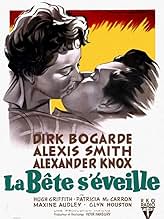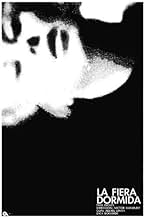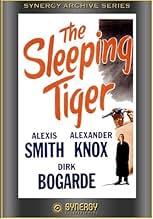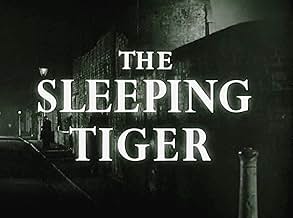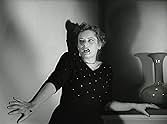IMDb-BEWERTUNG
6,5/10
1414
IHRE BEWERTUNG
Nachdem ein Krimineller in das Haus eines Psychotherapeuten einbricht, entgeht er durch die Einwilligung in eine Resozialisierung einer Verhaftung, jedoch entwickelt die Frau des Therapeuten... Alles lesenNachdem ein Krimineller in das Haus eines Psychotherapeuten einbricht, entgeht er durch die Einwilligung in eine Resozialisierung einer Verhaftung, jedoch entwickelt die Frau des Therapeuten Gefühle für ihn.Nachdem ein Krimineller in das Haus eines Psychotherapeuten einbricht, entgeht er durch die Einwilligung in eine Resozialisierung einer Verhaftung, jedoch entwickelt die Frau des Therapeuten Gefühle für ihn.
- Regie
- Drehbuch
- Hauptbesetzung
- Auszeichnungen
- 1 Nominierung insgesamt
Jimmy Charters
- Jazz Club Patron
- (Nicht genannt)
Martin Lyder
- Jazz Club Patron
- (Nicht genannt)
John Lynn
- Jazz Club Patron
- (Nicht genannt)
Ross Parker
- Barman
- (Nicht genannt)
Jim Tyson
- Jazz Club Patron
- (Nicht genannt)
Harry Van Engel
- Spectator at crash
- (Nicht genannt)
Empfohlene Bewertungen
The Sleeping Tiger is directed by Joseph Losey (using the alias Victor Hanbury) and adapted to screenplay by Derek Frye from the novel written by Maurice Moiseiwitswch. It stars Dirk Bogarde, Alexis Smith, Alexander Knox, Patricia McCarron, Maxine Audley and Hugh Griffith. Music is by Malcolm Arnold and cinematography by Harry Waxman.
When criminal Frank Clemmons (Bogarde) fails in his attempt to mug psychiatrist Dr. Clive Esmond (Knox), he is surprised to be invited to stay at the good doctor's house instead of going to prison. The doctor's motives are simple, he believes he can reform Frank whilst studying him at close quarters. Frank is only too happy to accept the offer, even more so when a relationship begins to form with Dr. Esmond's wife, Glenda (Smith). However, as passions stir and the tiger awakens, it's unlikely to end happily...
Blacklisted in Hollywood, Joseph Losey would find a home in the UK and produce some superb movies. The Sleeping Tiger has thematic links to two other great Losey movies, The Prowler (1951) and The Servant (1963), a sort of meat in the sandwich if you will. Dripping with psychologically redemptive sweat and pulsing with sexual frustrations, it's a film very much concerned with tightening the spring until it eventually explodes. And when it does it's well worth the wait, for there is no pandering to happy days endings, this has a kicker of a twist and it beats a black heart.
In the interim some patience is required as the key relationships at the centre of the plotting are steadily drawn, with Losey and Frye tantalising us with shards of character interest at regular intervals. Frank drifting on and off the rails livens proceedings, with the good doctor Esmond's loyalty putting some surprising spice in the story, while Frank's courting of Glenda (horse rides together, taking her dancing at a seedy jazz/blues club) and bullying of the maid, Sally (McCarron), keep us fascinated as to where this will end up.
Visually it's firmly in noir territory, more so in the first and last thirds, where Waxman (Brighton Rock) ensures shadows reflect the tonal shifts of plotting and the character's mental health. Arnold's (Academy Award Winner for The Bridge on the River Kwai) score is heavily jazz and blues influenced, mixing sorrowful beats with up-tempo thrums. Cast are excellent. Bogarde and Losey would compliment each other greatly and this is a good indicator of what would come during their five collaborations. Knox (Chase A Crooked Shadow) is wonderfully assured, while Smith (The Two Mrs. Carrolls) owns the movie with some deft changing of character gears.
The plot's a bit out there man, and Losey's slow teasing in the mid- sections may annoy those not familiar with his non American work. But this is very much a little ole devil worth seeking out. 7.5/10
When criminal Frank Clemmons (Bogarde) fails in his attempt to mug psychiatrist Dr. Clive Esmond (Knox), he is surprised to be invited to stay at the good doctor's house instead of going to prison. The doctor's motives are simple, he believes he can reform Frank whilst studying him at close quarters. Frank is only too happy to accept the offer, even more so when a relationship begins to form with Dr. Esmond's wife, Glenda (Smith). However, as passions stir and the tiger awakens, it's unlikely to end happily...
Blacklisted in Hollywood, Joseph Losey would find a home in the UK and produce some superb movies. The Sleeping Tiger has thematic links to two other great Losey movies, The Prowler (1951) and The Servant (1963), a sort of meat in the sandwich if you will. Dripping with psychologically redemptive sweat and pulsing with sexual frustrations, it's a film very much concerned with tightening the spring until it eventually explodes. And when it does it's well worth the wait, for there is no pandering to happy days endings, this has a kicker of a twist and it beats a black heart.
In the interim some patience is required as the key relationships at the centre of the plotting are steadily drawn, with Losey and Frye tantalising us with shards of character interest at regular intervals. Frank drifting on and off the rails livens proceedings, with the good doctor Esmond's loyalty putting some surprising spice in the story, while Frank's courting of Glenda (horse rides together, taking her dancing at a seedy jazz/blues club) and bullying of the maid, Sally (McCarron), keep us fascinated as to where this will end up.
Visually it's firmly in noir territory, more so in the first and last thirds, where Waxman (Brighton Rock) ensures shadows reflect the tonal shifts of plotting and the character's mental health. Arnold's (Academy Award Winner for The Bridge on the River Kwai) score is heavily jazz and blues influenced, mixing sorrowful beats with up-tempo thrums. Cast are excellent. Bogarde and Losey would compliment each other greatly and this is a good indicator of what would come during their five collaborations. Knox (Chase A Crooked Shadow) is wonderfully assured, while Smith (The Two Mrs. Carrolls) owns the movie with some deft changing of character gears.
The plot's a bit out there man, and Losey's slow teasing in the mid- sections may annoy those not familiar with his non American work. But this is very much a little ole devil worth seeking out. 7.5/10
Dirk Bogarde attempts to mug Alexander Knox at gunpoint in a dark London street. Knox overcomes him by twisting his arm. Next, Alexis Smith, Knox's wife, comes home from a trip to Paris, sees Bogarde in her house, assumes he is one of her psychiatrist husband's patients, but is told that he is a criminal who is living under her roof for six months as an experiment in criminal rehabilitation which her husband is carrying out as a humane alternative to sending the young man to jail. She accepts the arrangement with barely a shrug. Bogarde immediately proceeds to verbally and physically abuse the house maid and act rudely toward Smith. Yet for some reason she is attracted to him and soon they are having a hot affair under the husband's nose. And on and on it goes. One startling development after another. There are elements of the overly simplistic psychiatric rehab genre reminiscent of Hollywood classics like Now, Voyager and Spellbound but with a more realistic look and feel. The music is intense and draws attention to itself, from the cacophonous noise that Smith listens to on her home record player to the sizzling live jazz at the Soho dive where she goes to loosen up with her secret lover. Bogarde is supposed to be a low-life criminal but his polished accent and genteel mannerisms seem thoroughly middle-class and this is never explained. Alexander Knox seems made of wood yet is somehow believable as the kind of intellectually preoccupied and unflappable person who just might come up with the idea of inviting a mugger into his home as an eccentric form of research. And Smith, icily self-contained at the beginning, gradually gets a chance to do some dynamic emoting. She's very good in this. The title of the film symbolizes the wild impulses that sleep within us, waiting to be awakened. From the 2007 vantage point there are no important or original social or intellectual insights here but the way the film is edited, photographed and scored are deliberately jarring without distracting from the film's intent. Losey wants to shake us up and he succeeds.
A more apt title would have been The Sleeping Tigress, for it's Alexis Smith's performance that holds this movie together and lends it erotic friction. Despite her old-money looks and regal carriage, Smith numbered among the many talents which Hollywood mis- and under- used. She claimed attention in two late-forties Bogart vehicles, Conflict (where she was good) and The Two Mrs. Carrolls (in which she was even better, and held her own against Barbara Stanwyck). But most of her movie career consisted of mediocre roles the ones the star actresses turned down or had to refuse owing to other commitments. (It wasn't until Stephen Sondheim's Follies on Broadway in the 70s that her own star shone).
In this film from Joseph Losey's English exile following the Hollywood witch hunt, she plays the bored wife of psychotherapist Alexander Knox (and with him pottering around the house, who wouldn't be bored?). Bleeding-heart Knox takes a troubled young man with a prison record (Dirk Bogarde) under his roof in hopes of performing a therapeutic Pygmalion job on him. At first Smith acts snooty, then grows intrigued, and finally throws herself at Bogarde with pent-up abandon.
Comes the crunch as Knox, in a three-minute Freudian breakthrough reminiscent of Lee J. Cobb's instant rehabilitation of William Holden in The Dark Past, turns the lying, thieving, abusive Bogarde into a contrite milquetoast. When Bogarde then bids her farewell, Smith careens into dementia every bit as swiftly as Bogarde was healed and feigns an assault in hopes that Knox will defend her `honor' with that gun every therapist keeps in his desk drawer....
It's a lame story that might have been more convincing in an American context; the London setting and British conventions (in particular Knox's) stifle it. Bogarde started out playing this sort of charming wrong'un but isn't especially memorable here (except for his towering pompadour that must have been borrowed from Mario Lanza). But Smith's feral feline makes The Sleeping Tiger worth the ticket price.
In this film from Joseph Losey's English exile following the Hollywood witch hunt, she plays the bored wife of psychotherapist Alexander Knox (and with him pottering around the house, who wouldn't be bored?). Bleeding-heart Knox takes a troubled young man with a prison record (Dirk Bogarde) under his roof in hopes of performing a therapeutic Pygmalion job on him. At first Smith acts snooty, then grows intrigued, and finally throws herself at Bogarde with pent-up abandon.
Comes the crunch as Knox, in a three-minute Freudian breakthrough reminiscent of Lee J. Cobb's instant rehabilitation of William Holden in The Dark Past, turns the lying, thieving, abusive Bogarde into a contrite milquetoast. When Bogarde then bids her farewell, Smith careens into dementia every bit as swiftly as Bogarde was healed and feigns an assault in hopes that Knox will defend her `honor' with that gun every therapist keeps in his desk drawer....
It's a lame story that might have been more convincing in an American context; the London setting and British conventions (in particular Knox's) stifle it. Bogarde started out playing this sort of charming wrong'un but isn't especially memorable here (except for his towering pompadour that must have been borrowed from Mario Lanza). But Smith's feral feline makes The Sleeping Tiger worth the ticket price.
It's just a bit too much. The good doctor is attacked at gunpoint. He disarms the bad guy, then brings him home to dinner, where his high strung wife spars with the guy. Of course, the two eventually begin a movie long tryst. Dirk Bogarde is a bad boy who is a bundle of anger. He usually gets what he wants but carries more baggage than a porter at an airport. Alexis Smith is the femme fatale. She is older and bored with her psychologist husband, who is determined to resurrect the lad. He is willing to allow this man to do whatever he wants: bringing women to the house, bossing around the help, robbing jewelry stores and businesses. He is pursued by a cop who is on to him but has respect for the doctor and backs off on an arrest. It's hard to believe that this man should give a rip about Bogarde, but somehow he's willing to withdraw. The weakest part of the movie is when it all falls into place. It's so pat. A contemporary film would have built the house a card at a time; this happens in milliseconds. Then we have the denouement which I will not spoil. Let me just say it was a disappointment. The movie is visually sharp and the acting is pretty good. I never really like Alexis Smith much and she is a little grating here. Still, it's a decent performance and the subject is a little ahead of its time.
An overdone psychodrama whose twists and turns require some unfortunate stretches.
Too bad the plot ironies finally drown in a tidal wave of over-emotion. Apparently, ace director Losey couldn't tone down Smith's carpet chewing finale that unfortunately overwhelms what's gone before. At the same time, we're hit over the head with the finale's sleeping tiger irony. I think the audience can put two and two together without that billboard contrivance.
Seems Glenda (Smith) is the highly repressed wife of coldly intellectual Dr. Clive (Knox), who's been neglecting her emotional needs as he pursues his writing and research. In that same pursuit he takes proven felon Frank (Bogarde) into his household in order to test his theory of criminal reform. Clive's main reform tool is to excuse Frank's misbehavior whether criminal or moral in order to get at the causes of Frank's disordered psyche. Needless to say, such indulgences cause all kinds of problems, both inside the household and out.
As Doc's indulgences mount, it seems that an optimistic ideal is being mocked. Namely, that there are no bad people, only mistreated kids who then grow into criminal behavior. For example, while in the Doc's "care", Frank robs a jewelry store, and maybe worse, spits on Clive's generosity by seducing wife Glenda. In return, the Doc simply ignores the mounting transgressions. To me, that willingness, which also puts people in Doc's community in danger, looks like a mockery of a liberal brand of Freudianism then in vogue. It may be a provocative idea for the film to play with. Nonetheless, the tiger upshot undercuts that optimism, at the same time it clouds the film's one very real tragedy.
Anyway, Bogarde comes through with a nicely modulated turn, while Knox deadpans through thick and thin, even as Smith does the sleeping tiger to an ear-splitting roar. Apparently the movie was filmed more cheaply abroad at a time when TV was eating into movie profits. So, on a small budget, don't expect much in terms of scenery or action, though noir master Losey does work in some atmosphere. To me, the story's highlight and genuine tragedy is downplayed, but is present nevertheless if you think about it. As the 90-minutes stands, it's something of a disappointment given the talent involved.
(In passing-depending on the camera angle there are times when it appears Frank and Glenda resemble Lucy and Desi from TV's iconic I Love Lucy. Then again, maybe I had one too many beers!)
Too bad the plot ironies finally drown in a tidal wave of over-emotion. Apparently, ace director Losey couldn't tone down Smith's carpet chewing finale that unfortunately overwhelms what's gone before. At the same time, we're hit over the head with the finale's sleeping tiger irony. I think the audience can put two and two together without that billboard contrivance.
Seems Glenda (Smith) is the highly repressed wife of coldly intellectual Dr. Clive (Knox), who's been neglecting her emotional needs as he pursues his writing and research. In that same pursuit he takes proven felon Frank (Bogarde) into his household in order to test his theory of criminal reform. Clive's main reform tool is to excuse Frank's misbehavior whether criminal or moral in order to get at the causes of Frank's disordered psyche. Needless to say, such indulgences cause all kinds of problems, both inside the household and out.
As Doc's indulgences mount, it seems that an optimistic ideal is being mocked. Namely, that there are no bad people, only mistreated kids who then grow into criminal behavior. For example, while in the Doc's "care", Frank robs a jewelry store, and maybe worse, spits on Clive's generosity by seducing wife Glenda. In return, the Doc simply ignores the mounting transgressions. To me, that willingness, which also puts people in Doc's community in danger, looks like a mockery of a liberal brand of Freudianism then in vogue. It may be a provocative idea for the film to play with. Nonetheless, the tiger upshot undercuts that optimism, at the same time it clouds the film's one very real tragedy.
Anyway, Bogarde comes through with a nicely modulated turn, while Knox deadpans through thick and thin, even as Smith does the sleeping tiger to an ear-splitting roar. Apparently the movie was filmed more cheaply abroad at a time when TV was eating into movie profits. So, on a small budget, don't expect much in terms of scenery or action, though noir master Losey does work in some atmosphere. To me, the story's highlight and genuine tragedy is downplayed, but is present nevertheless if you think about it. As the 90-minutes stands, it's something of a disappointment given the talent involved.
(In passing-depending on the camera angle there are times when it appears Frank and Glenda resemble Lucy and Desi from TV's iconic I Love Lucy. Then again, maybe I had one too many beers!)
Wusstest du schon
- WissenswertesWhen this movie first appeared, the direction was credited to Victor Hanbury, a real-life Producer, who only agreed to take the credit when the actual Director, the blacklisted Joseph Losey, insisted that this would be a great help to him, as he needed the work. Although several versions of this movie, including the DVD, still credit Hanbury, there are prints where Losey is credited under his own name. The first several times it was shown on British television, in the late 1960s and early 1970s, Losey had the credit.
- PatzerAngry that Frank has left her Glenda wearing a black dress runs from the house, jumps in her car and drives off. Spotting Frank (Dirk Bogarde) walking along the road she stops and picks him up but she's now wearing a coat.
- Zitate
Glenda Esmond: You're not going to give me notice, like a servant or a waitress!
- VerbindungenFeatured in Joseph Losey: The Man with Four Names (1998)
Top-Auswahl
Melde dich zum Bewerten an und greife auf die Watchlist für personalisierte Empfehlungen zu.
- How long is The Sleeping Tiger?Powered by Alexa
Details
- Erscheinungsdatum
- Herkunftsländer
- Sprache
- Auch bekannt als
- The Sleeping Tiger
- Drehorte
- William Mansell, 24 Connaught Street, London, England, Vereinigtes Königreich(Smash & Grab 27 minutes from start)
- Produktionsfirmen
- Weitere beteiligte Unternehmen bei IMDbPro anzeigen
- Laufzeit
- 1 Std. 29 Min.(89 min)
- Farbe
- Seitenverhältnis
- 1.37 : 1
Zu dieser Seite beitragen
Bearbeitung vorschlagen oder fehlenden Inhalt hinzufügen

